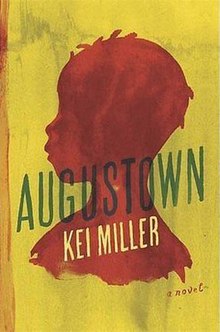Augustown
 2016 UK edition of Augustown | |
| Author | Kei Miller |
|---|---|
| Set in | Jamaica |
| Publisher | Weidenfeld & Nicolson |
Publication date | 2016 |
| Publication place | United Kingdom |
| Awards | OCM Bocas Prize for Caribbean Literature |
Augustown is a 2016 novel by Jamaican writer Kei Miller.[1] Augustown was published in the UK by Weidenfeld & Nicolson in 2016 and by Pantheon Books in the US.[2] It is Miller's third novel; he is also a poet.[3]
Plot
[edit]The book is based on an historical incident from 1921 in which Baptist preacher Alexander Bedward told congregants he would physically fly up to heaven;[3] instead he was committed to an insane asylum. In Miller's reimagining, however, the preacher proves able to fly and people gather in the impoverished neighborhood of Augustown to see the miracle for themselves.[4]
Reception
[edit]Reviewing Augustown for The New Yorker, Laura Miller contrasts the book to "the stereotype of a 'poet’s novel'—that is, it isn’t introspective, replete with long passages of description, and scant of plot. Instead, it is stuffed with the characters and stories of hardscrabble Augustown, a former hamlet on the outskirts of St. Andrew founded by slaves freed in 1838."[3]
In 2017, Augustown won the OCM Bocas Prize for Caribbean Literature.[5][6]
References
[edit]- ^ Grant, Colin (8 July 2016). "Augustown by Kei Miller review – a vivid modern fable about Jamaica". The Guardian. Retrieved 28 May 2017.
- ^ "AUGUSTOWN by Kei Miller". Kirkus Reviews. March 7, 2017. Retrieved 28 May 2017.
- ^ a b c Miller, Laura (May 22, 2017). "A Novel of the Sacred and the Profane in Jamaica". The New Yorker. Retrieved 28 May 2017.
- ^ Anderson, Sam (23 May 2017). "New Sentences: From 'Augustown,' by Kei Miller". The New York Times. Retrieved 28 May 2017.
- ^ "J’can Kei Miller wins OCM Bocas prize", Trinidad Sunday Express, 29 April 2017.
- ^ "Jamaican Kei Miller wins OCM Bocas Prize" Archived 2017-05-05 at the Wayback Machine, Trinidad and Tobago Guardian, 30 April 2017.
